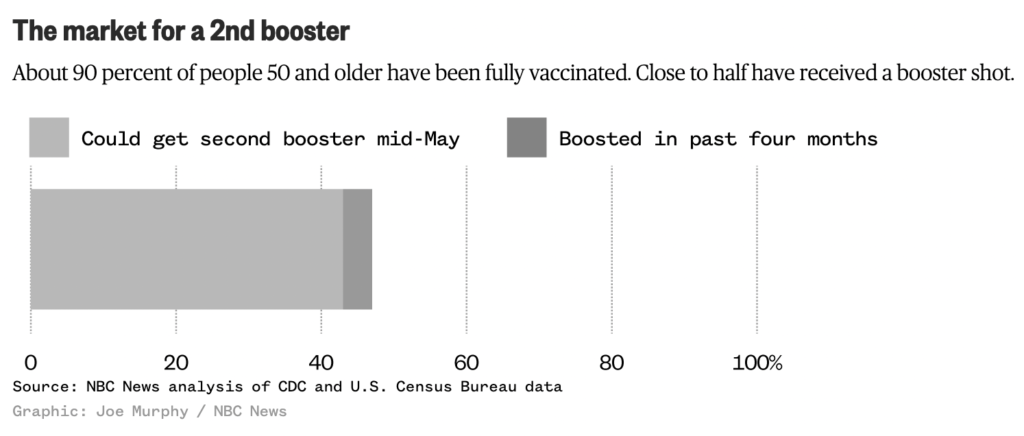An NBC News analysis shows that less than half of the people aged 50 and up — those authorized Tuesday for a second Covid-19 booster shot — have received their first booster shot and could get that shot by mid-May.
Forty-one percent of the more than 110 million people in that group who have completed a full vaccination series have not yet received their first booster, according to data from the Centers for Disease Control and Prevention and the U.S. Census Bureau. The Food and Drug Administration announcement Tuesday allows U.S. residents aged 50 and up to get an additional dose at least four months after their first booster.

Nearly half of the people in the U.S. who are vaccinated and could get a booster dose have yet to get it, though a larger share of vaccinated people aged 65 and up have gotten a booster. Among that group only about a third aren’t boosted.
On Tuesday, the FDA also authorized immunocompromised people to get a fifth shot, since that group was previously cleared to get a third vaccine dose as part of the primary series, followed by a booster.
The CDC signed off on the FDA’s move hours later, updating its recommendations to say that people aged 50 and up, as well as immunocompromised people, can get another Pfizer or Moderna booster. The agency also said those who got the primary and booster doses of the Johnson & Johnson vaccine could get an mRNA booster dose.
The FDA in September authorized Pfizer booster shots for people over 65, then did the same for Moderna and Johnson & Johnson boosters in October. All adults became eligible for boosters in November 2021.
Evidence of the booster’s benefit has since mounted. A CDC report released this month showed that from Dec. 19, 2021, through Jan. 31 — when the omicron variant was dominant — the hospitalization rate among adults who got vaccinated but not boosted was three times that of those who got boosters.
“We’ve got to do better when it comes to boosters, and we’re trying everything we can to get the message out of why it is so important,” Dr. Anthony Fauci, the president’s chief medical adviser, said at a White House briefing last week. “Because when you look at the data of what boosters do, particularly in the era of omicron, boosters are extremely important.”





